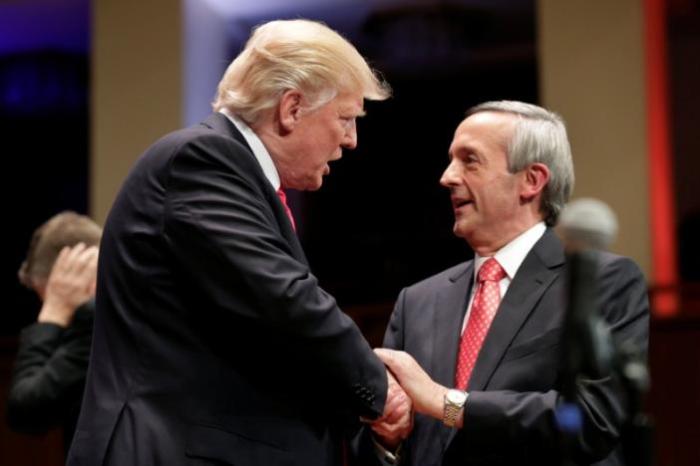Pastor Robert Jeffress, a Methodist Theologian, and Two Kingdoms Theology

Recently some critics of prominent Trump-supporting Dallas Baptist pastor Robert Jeffress have disapprovingly identified him as a supporter of "Two Kingdoms" theology, an historic Protestant belief about the division of duties between spiritual & earthly rule. Jeffress in public pronouncements has stressed that civil government is called to provide public order, not embody the Sermon on the Mount, on issues like immigration.
The critique of Jeffress is complaining that his stance precludes moral expectations of government. Jeffress seems not to have specifically cited Two Kingdoms theology, and the critics associating him with it typically are presenting only a caricature that suits their narrative.
One example is from United Methodist theologian Steve Harper, who came from that denomination's evangelical quarter but in recent years has departed evangelicalism on Christian teaching about marriage. He penned a column for a liberal Methodist website that conflated Jeffress with an "extreme" form of Two Kingdoms theology:
I had to do some research even to remember what two-kingdom theology is. In a milder form, it is the recognition that there are two kingdoms – the Kingdom of God and "the kingdoms of this world." We have no problem affirming that. But the problem is, a handful of advocates have gone on to claim that the two kingdoms are radically separate, and that the values of the Kingdom of God are only operative for believers and for the Church–not the state or the government. This more extreme interpretation is the one being used by a small, but aggressive group of (mostly) white-male Christian fundamentalists.
Harper accuses Jeffress of "theological hogwash" for asserting, "While Scripture commands individual Christians and churches to show mercy to those in need, the Bible never calls on government to act as a Good Samaritan." So Harper cites the Old Testament prophetic tradition of calling Israel's kings to account, and of Jesus lamenting unrighteousness in King Herod's time. Harper complains:
To hold the extremist two-kingdom theology, one must overlook the social holiness tradition that runs from Genesis to Revelation, and which has continued to define the Christian tradition ever since. The extremist version of two-kingdom theology is a false interpretation of the Gospel that has been relegated to the theological junk yard–which makes its use by a few fundamentalists all the more curious and troubling.
And Harper concludes:
By pulling out an obscure and already-debunked theological view, the fundamentalists are exposing their lack of biblical savvy, despite their claims to be the ones who know how to interpret the Bible correctly. And even more, their use of the counterfeit two-kingdom theology is a sign of their desperation to "clothe" the emperor, who actually has no clothes on. At most, it is a bogus "covering" made of theological Saran Wrap.
Here it's unclear whether Harper is condemning just "extremist" versions of Two Kingdoms theology or the whole tradition. If he dismisses the whole tradition, it's unclear what he proposes instead. The divine standards applied to ancient Israel as a Hebrew theocracy under special covenant with God do not fully apply to any nation today, Harper would surely agree. And presumably he would further agree that if he were to phone 911 when a family member was being assaulted, he would expect violent intervention by law enforcement, not counsel to turn the other cheek.
Two Kingdoms theology is an attempt to understand how God's sovereignty works through both His spiritual rule over the church and His appointment of flawed earthly rulers to seek a proximate justice for all. Harper's theory that Jeffress relies on Two Kingdoms comes apparently from this Texas Observer article by Robert Brockman, who offers a parody of the tradition, claiming it justifies a cold form of governance indifferent to human compassion.
The tradition of Two Kingdoms is of course much richer and more appealing. Brad Littlejohn offers a nice summary here, explaining the doctrine guards against theocracy, by denying civil rulers speak directly for God, and rejects Utopianism, by denying civil government can achieve social perfection. He notes that under Two Kingdoms:
Political rule is not amoral or free-floating, making things up according to the demands of realpolitik. No, it is bound to the moral order of the world as God created it, albeit that order has been distorted by sin, thus requiring political rule to take a distinctively coercive shape. Because the fundamental task of political rule is the maintenance and flourishing of created goods, rather than the distinctive tasks of redemption, which are the chief focus of Scripture, the general norm of political rule is natural revelation and natural law, not Scripture, and hence Christians do not have anything like a monopoly on good government.
Perhaps neither Jeffress nor his critics fully appreciate what is meant by Two Kingdom theology. But Evangelicals, who often are disconnected from church tradition, would do well to reconnect with this historic Protestant teaching if they are to address political principles effectively and thoughtfully.
Originally posted at IRD's blog.




























